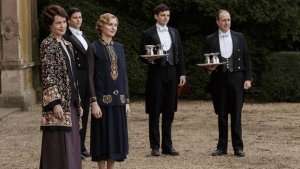Upstairs, Downstairs, Across The Pond
March 01, 2016

History Professor Julie Taddeo explores gender, class and sexuality in British period dramas.
By Karen Shih '09, Terp Magazine
Photo courtesy of PBS
This weekend, it’s all over: You’ll see if Anna has her baby, if Barrow leaves the only job he’s ever known, and if Lady Edith finally gets a happy ending.
“Downton Abbey,” ITV/PBS’ soapy saga of the Crawley family and its servants, with its impeccable Edwardian and Jazz Age costumes, period sets and antique automobiles, has captured American imaginations for six years. More than 10 million people are expected to watch the March 6 series finale—after which visiting Associate Professor Julie Taddeo expects they’ll be looking for their next British period drama fix.
“Escapism and fantasy and nostalgia are all important—we shouldn’t trivialize,” says Taddeo, who studies gender, class and sexuality in Victorian and 20th century Britain. “These shows help us understand more of the mindset of how people lived, the values of the time and how they were struggling with issues that were relevant then and are still relevant today.”
These include voting rights, access to contraception—the lack of which leads to Edith having a child out of wedlock—and rape, which devastates Anna, a lady’s maid.
“Julian Fellowes [the show’s creator] gets criticized for using it as a ratings device, but the way he handled the issue felt true to the time,” she says. “The shame the victim felt, the way she couldn’t tell anyone, not even her husband… Viewers get upset when the period drama is too realistic, but the reality is that any one of those women downstairs could have been raped by their employer or other male employees because that was a common occurrence.”
“Downton” also explores homosexuality through depressed butler Thomas Barrow, but Taddeo finds his portrayal as a conniving blackmailer unbelievable. “The truth is, he’s the one that would be blackmailed under the law. Why doesn’t Thomas just leave and go to London where there’s a thriving gay subculture in the 1920s?”
She and other scholars explored these issues in the 2014 volume “Upstairs and Downstairs: British Costume Drama Television from The Forsyte Saga to Downton Abbey,” which she edited. Now, she’s working on a new collection of essays on masculinity.
Read more here.

